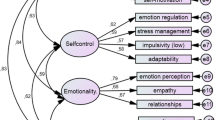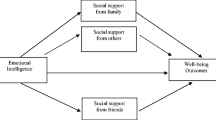Abstract
The purpose of this research was to examine associations between subjective wellbeing and emotional intelligence in the Lithuanian youth sample. In the research, a simple random sample consisted of 556 respondents. The procedure was administered online and followed the General Data Protection Regulation guidelines. Before data gathering, this study was reviewed and approved by the research ethics board of the Institute of Management and Psychology. The study revealed strong positive associations between subjective wellbeing and emotional intelligence, and the fit of the model on associations between the variables of wellbeing and emotional intelligence was good. The theoretical significance of the study is that the paper reveals the essence of the existence of a latent factor of subjective well-being. The practical significance is that the results of the study can be used in the practice of psychological counseling and psychodiagnostics to assess the relationship between subjective well-being and emotional intelligence.

Similar content being viewed by others
Data Availability
The data that support the findings of this study are available on request from the corresponding author.
Change history
14 November 2023
This article has been retracted. Please see the Retraction Notice for more detail: https://doi.org/10.1007/s12144-023-05370-x
References
Boyd, J. E., O’Connor, C., Protopopescu, A., Jetly, R., Lanius, R. A., & McKinnon, M. C. (2020). The contributions of emotion regulation difficulties and dissociative symptoms to functional impairment among civilian inpatients with posttraumatic stress symptoms. Psychological Trauma: Theory, Research, Practice, and Policy, 12(7), 739–749. https://doi.org/10.1037/tra0000576
Diener, E., Emmons, R. A., Larsen, R. J., & Griffin, S. (1985). The satisfaction with life scale. Journal of Personality Assessment, 49, 71–75. https://doi.org/10.1207/s15327752jpa4901_13
Diener, E., Napa-Scollon, C. K., Oishi, S., Dzokoto, V., & Suh, E. M. (2000). Positivity and the construction of life satisfaction judgments: Global happiness is not the sum of its parts. Journal of Happiness Studies, 1, 159–176. https://doi.org/10.1023/A:1010031813405
Diener, E., Oishi, S., & Lucas, R. E. (2009). Subjective well-being: The science of happiness and life satisfaction. Oxford Handbook of Positive Psychology, 2, 187–194. https://doi.org/10.1093/oxfordhb/9780195187243.013.0017
Diener, E., Sandvik, E., & Pavot, W. (1991). Happiness is the frequency, not the intensity, of positive versus negative affect. In F. Strack, M. Argyle, & N. Schwarz (Eds.), Subjective well-being: An interdisciplinary perspective (pp. 119–139). Pergamon.
Diener, E., & Tay, L. (2015). Subjective well-being and human welfare around the world as reflected in the Gallup world poll. International Journal of Psychology, 50(2), 135–149. https://doi.org/10.1002/ijop.12136
Diener, E., Wirtz, D., Tov, W., Kim-Prieto, C., Choi, D., Oishi, S., & Biswas-Diener, R. (2010). New measures of well-being: Flourishing and positive and negative feelings. Social Indicators Research, 39, 247–266. https://doi.org/10.1007/s11205-009-9493-y
Efklides, A., & Moraitou, D. (2013). A positive psychology perspective on quality of life. Social Indicators Research Series, 51, 1–14. https://doi.org/10.1007/978-94-007-4963-4
Fredrickson, B. L. (2000). Cultivating positive emotions to optimize health and well-being. Prevention & Treatment, 3, 1–25. https://doi.org/10.1037/1522-3736.3.1.31a
Frisch, M. B., Clark, M. P., Rouse, S. V., Greenstone, A., & Kopplin, D. A. (2005). Predictive and treatment validity of life satisfaction and the quality-of-life inventory. Assessment, 12(1), 66–78. https://doi.org/10.1177/1073191104268006
Grandey, A. A., & Melloy, R. C. (2017). The state of the heart: Emotional labor as emotion regulation reviewed and revised. Journal of Occupational Health Psychology, 22, 407–422. https://doi.org/10.1037/ocp0000067
Hellwig, S., Roberts, R. D., & Schulze, R. (2020). A new approach to assessing emotional understanding. Psychological Assessment, 32(7), 649–662. https://doi.org/10.1037/pas0000822
Kafetsios, K., & Zampetakis, L. A. (2008). Emotional intelligence and job satisfaction: Testing the mediatory role of positive and negative affect at work. Personality and Individual Differences, 44, 712–722. https://doi.org/10.1016/j.paid.2007.10.004
Kline, R. (2015). Principles and practices of structural equation modeling. Guilford Press.
Koivumaa-Honkanen, H., Kaprio, J., Honkanen, R., Viinamäki, H., & Koskenvuo, M. (2004). Life satisfaction and depression in a 15-year follow-up of healthy adults. Social Psychiatry and Psychiatric Epidemiology, 39(12), 994–999. https://doi.org/10.1007/s00127-004-0833-6
Kondratenko, V. V., Zaitsev, I. A., Nesterenko, A. M., Homon, L. V., & Chykolba, G. N. (2021). Modern information technologies in the process of physical education in universities of Ukraine. Scientific Bulletin of Mukachevo State University. Series “Pedagogy and Psychology”, 7(2), 101–108.
Koopmans, T. A., Geleijnse, J. M., Zitman, F. G., & Giltay, E. J. (2010). Effects of happiness on all-cause mortality during 15 years of follow-up: The Arnhem elderly study. Journal of Happiness Research, 11, 113–124. https://doi.org/10.1007/s10902-008-9127-0
Lazarus, R. S., & Folkman, S. (1984). Stress, appraisal, and coping. Springer.
MacCann, C., & Roberts, R. D. (2008). New paradigms for assessing emotional intelligence: Theory and data. Emotion, 8, 540–551. https://doi.org/10.1037/a0012746
Mahdysiuk, L. I., Demchuk, V. B., & Pavlova, B. V. (2021). Modern approaches to the prevention of deviant behaviour in the activities of psychological services. Scientific Bulletin of Mukachevo State University. Series “Pedagogy and Psychology”, 7(1), 9–17.
Mayer, J. D., & Salovey, P. (1997). What is emotional intelligence? In P. Salovey & D. Sluyter (Eds.), Emotional development and emotional intelligence: Educations implications (pp. 3–31). Harper Collins.
Murtaugh, P. A. (2014). In defense of P values. Ecology, 95(3), 611–617. https://doi.org/10.1890/13-0590.1
Öztürk, F., & Karagün, E. (2020). Investigation of life satisfaction and interpersonal problem-solving skills of high school students according to their sports status. Educational Research and Reviews, 15(7), 426–432. https://doi.org/10.5897/ERR2020.4017
Pekaar, K. A., Bakker, A. B., Born, M. P., & Van Der Linden, D. (2019). The consequences of self- and other-focused emotional intelligence: Not all sunshine and roses. Journal of Occupational Health Psychology, 24(4), 450–466. https://doi.org/10.1037/ocp0000134
Petrides, K. V. (2011). Ability and trait emotional intelligence. In T. Chamorro-Premuzic, A. Furnham, & S. von Stumm (Eds.), The Blackwell-Wiley handbook of personality and individual differences (pp. 656–678). Wiley.
Ringoot, A. P., Jansen, P. W., Graaff, J. S.-D., Verhulst, F. C., & Tiemeier, H. (2013). Young children’s self-reported emotional, behavioral, and peer problems: The Berkeley puppet interview. Psychological Assessment, 25(4), 1273–1285. https://doi.org/10.1037/a0033976
Rose-Krasnor, L. (1997). The nature of social competence: A theoretical review. Social Development, 6, 111–135. https://doi.org/10.1111/j.1467-9507.1997.tb00097.x
Salguero, M. J., Extremera, N., & Fernandez-Berrocal, P. (2012). Emotional intelligence and depression: The moderator role of gender. Personality and Individual Differences, 53, 29–32. https://doi.org/10.1016/j.paid.2012.02.006
Sánchez-Álvarez, N., Extremera, N., & Fernández-Berrocal, P. (2016). The relation between emotional intelligence and subjective well-being: A meta-analytic investigation. The Journal of Positive Psychology, 11(3), 276–285.
Seo, E. H., Kim, S. G., Kim, S. H., Park, J. H., & Yoon, H.-J. (2018). Life satisfaction and happiness associated with depressive symptoms among university students: A cross-sectional study in Korea. Annals of General Psychiatry, 17(1) article number 52. https://doi.org/10.1186/s12991-018-0223-1
Author information
Authors and Affiliations
Corresponding author
Ethics declarations
Conflict of Interest
The authors confirm, that they have no conflicts of interest to disclose.
Ethical Approval
This work was approved by the Research Ethics Council of the Institute of Management and Psychology.
Informed Consent
All respondents (or their parents, when necessary) provided their consent and completed an online questionnaire.
Additional information
Publisher’s Note
Springer Nature remains neutral with regard to jurisdictional claims in published maps and institutional affiliations.
This article has been retracted. Please see the retraction notice for more detail: https://doi.org/10.1007/s12144-023-05370-x"
Rights and permissions
Springer Nature or its licensor (e.g. a society or other partner) holds exclusive rights to this article under a publishing agreement with the author(s) or other rightsholder(s); author self-archiving of the accepted manuscript version of this article is solely governed by the terms of such publishing agreement and applicable law.
About this article
Cite this article
Dirzyte, A., Patapas, A. RETRACTED ARTICLE: Associations between emotional intelligence and subjective wellbeing in the Lithuanian youth sample. Curr Psychol 42, 12695–12700 (2023). https://doi.org/10.1007/s12144-021-02598-3
Accepted:
Published:
Issue Date:
DOI: https://doi.org/10.1007/s12144-021-02598-3




